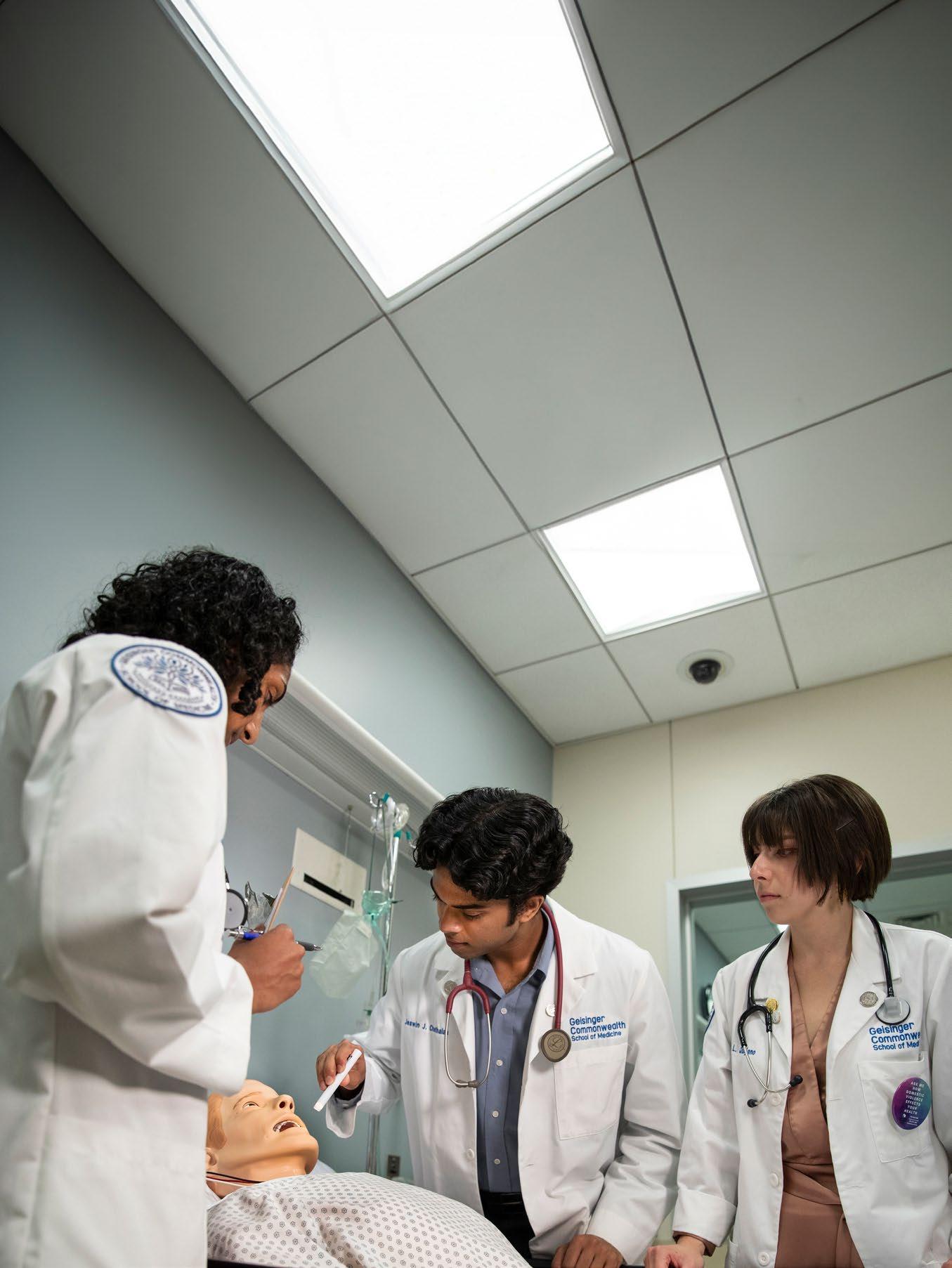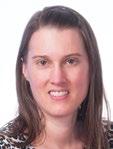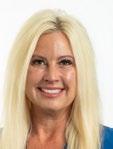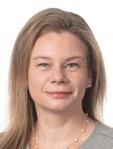Abigail Geisinger Scholars Program



being free to serve the communities you love, working in a system driven by kindness, excellence, learning and innovation — without the burden of overwhelming medical school debt. The Abigail Geisinger Scholars Program offers relief, giving you the opportunity to pursue your dreams without worry.

Geisinger College of Health Sciences is committed to nondiscrimination in all employment and educational programs or activities. Concerns or questions may be directed to the Title IX coordinator whose contact information is available at geisinger.edu/titleix.
Medical students like you share the same dream: A career that builds lifelong personal relationships with patients and places you at the center of your community as a trusted source of knowledge and compassion.
Geisinger supports the ideals of its future doctors by putting primary care and psychiatry where they belong — at the forefront of every innovation and technological advance we make. Through the Abigail Geisinger Scholars Program, we back that pledge with relief from medical school tuition and fees, as well as a $2,000 per month stipend during your years at Geisinger Commonwealth School of Medicine.


Nia Long has always known she wanted to be a doctor. As a child, she preferred PBS documentaries to cartoons and, when a heart-related health scare sent her to Children’s Hospital of Philadelphia, she formed a lasting, positive impression of the power of medicine. “I ended up being OK, but seeing the families and children there and going through that experience changed me,” she said.
Nia also knew early on that she would practice family medicine. “I worked with a lot of underserved populations in high school,” she said. “My experiences kept leading me toward primary care. I volunteered at my local homeless shelter and got to see how complex the medical issues were in our homeless populations. So, I knew I wanted to work mostly in community healthcare, but I also wanted to build relationships with patients — not just treating illness and then sending them out to never see them again.”
Nia’s concern for disadvantaged and underserved populations stems from deep understanding and empathy. “I grew up in a low-income home,” she said. “When I was a kid, we had ups and downs. The electricity was turned off and we
“My experiences kept leading me toward primary care.”
almost lost our house. So I am very sympathetic — I always knew that my own family could be in a homeless situation ourselves.”
As a first-generation-to-college student, Nia received support from her high school, East Stroudsburg High School South, and advisers at The University of Scranton, where she double-majored in neurosciences and philosophy. When it was time to apply to medical school, once again, she knew just what she wanted.
“I was particularly looking for schools with a focus on primary care,” she said. “I also wanted a program that understood rural health. So, Geisinger was always my first choice. Since I went to The University of Scranton, I knew about the special things Geisinger’s been doing, like the Fresh Food Farmacy and some of the other programs. I knew about the Abigail Geisinger Scholars Program, as well. And for someone like me, who already knew I wanted primary care and knew how expensive medical school is — for my family, it was a kind of saving grace to be accepted into the program.”
Now one year into medical school, Nia is looking forward to spending more time in Geisinger’s clinics in Dallas and Tunkhannock that resemble her rural hometown.
“I do think the Scholars Program is pretty exceptional in how they transition students into understanding their path in primary care — getting us involved early and then supporting us throughout that process,” she said. “And I love how Geisinger elevates primary care. Geisinger has turned how we think about medicine on its head by showing just how much primary care helps the community, and how much it helps the people you’re trying to serve. And now, as my class goes into clinicals, I think the Abigail Geisinger Scholars Program has provided us with enough information to systematically and strategically plan out the next couple of years in a way that’s going to allow us to be successful in whatever path we choose.”
In 2017, the Arnold P. Gold Foundation’s Richard Levin, MD, offered a blunt observation: “Doctors enter the profession to help and care for humans,” he said. “They do not sign up to be scribes or billing agents.” His statement struck at the heart of what plagues modern medicine, and particularly primary care and psychiatry — namely, inefficiencies and bureaucratic barriers that frustrate both doctor and patient and make good healthcare anything but easy.
Thanks to Geisinger’s redesign of primary care, a team led by J. Edward Hartle, MD, chief medical officer, the bond between primary care doctor and patient that should be at the heart of good health has been restored. According to Dr. Hartle, the redesign had two simple goals: to make primary care a joy to practice for doctors and to ramp up the level of care patients received in primary care settings. For patients, this means more intermediate
care services, such as IV infusions, and behavioral health services available right in the clinic. For physicians, primary care redesign removed excessive administrative burdens that negatively affect provider well-being.
Today, Geisinger’s transformed clinics are frustrationfree zones staffed by interdisciplinary teams that make primary care easier for patients and more rewarding for doctors. For example, patients long annoyed by having “homework” like getting lab work done or a prescription filled can now get all these services and more in one visit.
Everyone has more time with their doctor, and seniors even get things like social activities and a gym at special Geisinger 65 Forward Health Centers. And the physician inbox that once nagged clinicians with constant electronic chatter is now a responsibility shared among team members.

Three Geisinger hospitals have been recognized in U.S. News & World Report’s list of Best Hospitals 2024-2025:
• Geisinger Medical Center
• Geisinger Wyoming Valley Medical Center
• Geisinger Community Medical Center
“When I started my career, before primary care redesign, it was up to the physician to get everything done for the patient,” said Kim Kovalick, DO, a family medicine physician at Geisinger Kingston. “Now, we have a care team that collaborates in the care of our patients. From the moment I walk in the door, I have many team members who help me provide great care. For example, a nurse will give recommended immunizations before I even walk in the room. They order blood work and preventive screenings such as mammograms and DEXA/bone density tests. We can take more time with patients with complicated medical conditions and have a team approach to make sure the patient has all the resources they need.”
She added, “If patients have multiple medical problems — congestive heart failure or diabetes, for example — we have case managers who can help educate them about their disease process. We also have dietitians and medical pharmacists to help educate our patients. All these team members have helped to not only reduce physician burnout, but also improve overall care.”
In 2024, Geisinger Lewistown Hospital ranked among the top 100 rural and community hospitals by Chartis Center for Rural Health for the third year.


Tyler Schubert had an ideal medical school application — a degree from Franklin and Marshall College, experience working in a hospital and exceptional research credentials from labs at Children’s Hospital of Philadelphia and Washington University in St. Louis. So, when he went looking for a medical school, he had options. He chose Geisinger Commonwealth for two reasons.
“The Abigail Geisinger Scholars Program was the number one thing that attracted me to Geisinger. I like that the health system is serious about solving the physician maldistribution problem. But MyCode was the second reason,” Tyler said, referring to the system’s precision medicine project and its biobank of more than 350,000 participants.
Opportunity to work with MyCode a major draw for this Abigail Geisinger Scholar
Accepted to both the Abigail Geisinger Scholars Program and Geisinger Commonwealth School of Medicine’s Medical Research Honors Program, Tyler is working on a National Institutes of Health-funded study on familial hypercholesterolemia, a genetic condition that affects one in 250 people and can cause early onset of coronary artery disease if not treated.
A co-principal investigator is happy to have Tyler working on the project, helping the implementation science team analyze qualitative data from clinician interviews and direct observations and synthesizing it. “From our talks, I know Tyler really wants to do internal and
incorporate genomics into his practice. Geisinger is one of the best places to do this kind of work. And because he is an Abigail Geisinger Scholar, our study directly relates to the work he’ll do,” she said. “He’s making great connections here and learning how we use genomics right in the electronic health record. It all seems like a perfect fit.”
Abigail Geisinger Scholars have opportunities to take part in clinical research throughout Geisinger.
Fresh Food Farmacy
This program offers nutritious groceries for eligible patients referred by their physician to help better control their diabetes in light of food insecurity. The program also supplies food for the patients’ families. Eligible patients and their families can enjoy better health, which is a priority for Geisinger.
MyCode Community Health Initiative
This precision-medicine project analyzes the DNA of registered patient-participants, improving healthcare by finding ways to diagnose medical conditions earlier — even before symptoms appear — and developing new ways to manage these diseases.
Geisinger 65 Forward
These primary care clinics are tailored to meet the unique needs of those age 65+. People get longer appointments, social activities, wellness classes and VIP-level, personalized care. Everything the patient needs is under one roof in a calm, relaxing environment.
Geisinger at Home
Teams of doctors, nurses, dietitians, social workers and other medical professionals help keep patients with difficult-to-manage cases healthier and better connected to care by delivering it right to their doorstep.
LIFE Geisinger
LIFE Geisinger is a program for adults 55 and older designed to give patients the support they need to live at home independently while using comprehensive daily living and health services. An experienced team coordinates care based on individual needs, offering caregivers relief and support.
Federally Qualified Health Centers
Scholars can take part in experiences at federally funded nonprofit health centers, which serve medically underserved areas and populations, providing care regardless of a patient’s ability to pay.





Helen Guo may seem like she’s in a hurry. She earned her undergraduate degree and her master’s in public health from a University of California at Berkeley accelerated 4 + 1 program. Today, as an Abigail Geisinger 3 + 3 Scholar, she’s keeping up the tempo. She’s now two years into the accelerated program that will place her in a Geisinger Wyoming Valley Medical Center internal medicine residency in just three years. Now a few months into her clinical rotations, Helen has already completed her internal medicine and family medicine clerkships. “Immersion into the clinical environment has proved that internal medicine is the right choice for me,” she said.
“I was really interested in Geisinger mainly for the Abigail Geisinger Scholars Program,” she added. “I feel like the 3 + 3 program made perfect sense. I am certain about primary care, and I want the ability to finish one year sooner to start working in the community.”
Interest in social drivers of health are the driving force behind both her MPH and her choice to pursue internal medicine. “At Berkeley, I was studying infectious diseases specifically. The COVID pandemic hit right at the end of my master’s, so that
Accelerating good health: Abigail Geisinger Scholar can’t wait to have a wellness impact
was interesting to see public health in action,” she said. “I was learning academically about the social drivers of health and after I graduated, I started working at the County of San Mateo in COVID-19 prevention. I was seeing all of that playing out — who was being affected and who was able to access resources, who was able to take time off work and who wasn’t — I think that’s what drew me toward medicine. I wanted to make more of an impact and have more one-on-one connections with people. That’s really what drew me to Geisinger too — that community aspect.”
Now two years into the 3 + 3 program, Helen is already a fixture in the Geisinger Wyoming Valley clinic where she will do her residency. To encourage continuity at her residency site, Helen spends every Friday afternoon in the clinic. This additional time has helped her build strong relationships with her attending physicians, residents and nurses, many of whom will be her future colleagues. It has also provided the opportunity to follow up with the same patients over time.
“I know I’m getting a really good education at Geisinger because, for me, what’s really important is that patient/doctor relationship,” she said. “I’ve had experiences myself where I’ve gone to the doctor and feel like I’ve brought up concerns that were laughed off. As a future doctor, whenever I have a patient, I
never want them to feel that way. I want them to know every concern of theirs is being taken seriously, that they are being listened to. And from working with Dr. (Michael) Fox in the Geisinger Wyoming Valley clinic, I feel like he is the embodiment of what I want to do in my future practice. He takes the time to ask his patients about their lives and gets to know them. They’ll even swap reading recommendations. That’s really what I want to do as an internal medicine doctor — just take the time to listen to the patient.”
For someone always choosing to accelerate, taking that time might sound out of character. But Helen said clarity about her future makes her feel comfortable about slowing down now and enjoying the journey. “I like knowing the colleagues and the clinic where my residency will be,” she said. “I already know who my residency mentor is, so I’ve been able to start building that relationship with Dr. (Wasique) Mirza. I’ve met all the residents there. It’s a wonderful, holistic program. The idea was to get us integrated into that setting a little sooner. I think it’s amazing to be able to see the patients who will be my patients and to practice some of the things we’re already learning.”
Abigail Geisinger Scholars accepted to the Primary Care 3 + 3 Accelerated Program complete medical school in three years, followed by a directed pathway into a three-year residency in one of Geisinger’s following programs:
• Family medicine residency at Geisinger Lewistown Hospital
• Family medicine residency at the Kistler Clinic of Geisinger South Wilkes-Barre
• General internal medicine – Northeast residency at Geisinger Wyoming Valley Medical Center
• General internal medicine – Central residency at Geisinger Medical Center
This means students in the Primary Care 3 + 3 Accelerated Program enter residency one year earlier than their peers, allowing them to start serving their community sooner.
Overview
• Accelerated training allows students to earn their medical degree in 3 years
• Early immersion/orientation with staff/faculty and our residency programs
• Longitudinal Clinical Experience (LCE) at participating residencies early in the curriculum
• Scholarly summer immersion program with participating residencies
• Students spend one half-day per week in a continuity practice aligned with their residency during Phase 2 of the curriculum
• Students meet all medical education program objectives
• Medical school completion in 3 years
• Rigorous programming aimed at time efficiency and robust experiences
• Advising and mentoring by primary care physicians and residents
• Peer collaboration and fellowship
• Directed pathway into one of four residencies of your medical school training

Seven Geisinger hospitals recognized as “high-performing” by U.S. News & World Report in 2023, including:
• Geisinger Medical Center
• Geisinger Wyoming Valley Medical Center
• Geisinger Lewistown Hospital
Abigail Geisinger Scholars Program


Kim Kovalick, DO
Assistant Dean of Primary Care Education

Anja Landis, MD
Director of Abigail Geisinger Scholars Program
Michelle Schmude, EdD, MBA
Vice Provost for Enrollment Management

Deirdre Jones
Associate Director of Admissions 570-504-9068 • mdadmissions@geisinger.edu
Geisinger believes the future of medicine lies in robust primary care and psychiatry — care that anticipates and prevents disease, focuses on wellness and recognizes mental health and well-being as fundamental to stronger, more resilient communities. That’s why the Abigail Geisinger Scholars Program focuses on the following specialties:
• Family medicine
• General internal medicine
• Medicine-pediatrics
• Psychiatry
Our Scholars Program frees medical students from the financial concerns that could derail their dreams. As an Abigail Geisinger Scholar, you will:
• Get relief from overwhelming medical school tuition and fees.
• Receive a $2,000 per month stipend.
• Become a Geisinger-employed physician in one of the specialties listed above upon completion of residency training. One year of service equals one year of support.
Submit an American Medical College Application Service® (AMCAS®) primary application and Geisinger Commonwealth secondary application.
• Answer “yes” to the first question on the Geisinger Commonwealth secondary application regarding interest in applying for the Abigail Geisinger Scholars Program.
• Complete the question regarding primary care and/or psychiatry and provide any updates to your experiences that align with the Abigail Geisinger Scholars Program.
You are considered for admission into the MD program before interviewing for the Abigail Geisinger Scholars Program. You are selected to participate in this program based on financial need, merit, mission alignment, likelihood of staying at Geisinger beyond the service obligation and interview assessment.
To learn more, visit go.geisinger.edu/abigailcare
Geisinger College of Health Sciences
525 Pine St. Scranton, PA 18509
Call: 570-504-9068 go.geisinger.edu/abigailcare mdadmissions@geisinger.edu

Growing up in Clarks Summit, Pa., Nick Gershey was inspired by the medical school right near his hometown that was gaining distinction for its positive impact.
“Having a medical school in this area that’s focused so much on community was a wonderful thing,” he said.
Medicine is the highest form of service
“And, as a kid, thoughts about my future consistently revolved around a desire to give back to the community that raised me. The Abigail Geisinger Scholars Program is an outlet for me to fulfill that goal.”
Nick has worked with Geisinger College of Health Sciences Pathway Programs, volunteering at a middle school serving students of greater economic need. “My community immersion project shows kids they can become the next generation of physicians. We do this by giving presentations on different specialties followed by a fun activity,
such as making a spine out of candy. The intelligence of these young children is impressive!”
Nick is most interested in med-peds as a primary care specialty. He was introduced to it thanks to the seminar series, a unique feature of the Abigail Geisinger Scholars Program.
“We’re able to see why each specialty is so interesting,” Nick says. “When you’re a firstyear medical student, you may or may not really know what each one entails. The medpeds residency director in Danville discussed his work in complex care, and I thought about having the ability to treat either pediatrics or internal medicine and follow patients through that transition of pediatric to adult medicine.”
The seminar series has reinforced the service aspect of medicine for Nick. “Hearing about the lives of these physicians, how they conduct themselves every day and hearing about why they do medicine — it’s been one of the great benefits of the Scholars Program. The program’s focus of bettering the Geisinger community at large is what keeps me motivated in pursuing my goal of becoming a physician.”
Geisinger Commonwealth School of Medicine is committed to non-discrimination in all employment and educational opportunities.